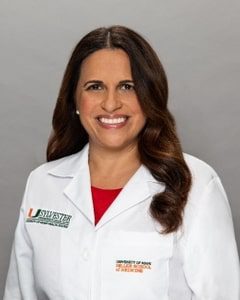|
Getting your Trinity Audio player ready...
|

(Photo Courtesy of Sylvester Comprehensive Cancer Center)
Treatment outcomes for patients with malignant pleural mesothelioma, a rare cancer commonly known as mesothelioma, are often affected by social determinants of health and overall survival rates could be improved by addressing these health disparities and improving access to specialized care.
That’s the key takeaway from new research published Mar. 23 by investigators at the Sylvester Comprehensive Cancer Center at the University of Miami Miller School of Medicine, and collaborators, whose study appears in the journal JAMA Network Open.
“We found that mesothelioma patients who receive treatment in a timely fashion — and have access to specialized care, including surgery, radiation therapy and chemotherapy — have better outcomes,” said oncologic surgeon Estelamari Rodriguez, MD, MPH, associate director of community outreach in thoracic oncology and senior author on the paper.
“Unfortunately, many patients have poor access due to health disparities and geographical factors,” Dr. Rodriguez said.
Mesothelioma cases are rare in both the U.S. and globally, representing only 0.17 percent or about 3,000 of all U.S. tumor diagnoses in 2018, the authors noted. That percentage is expected to decline further with greater awareness of the risks posed by asbestos exposure.
Consequently, many physicians have little or no experience treating mesothelioma, and those with specialized training and expertise often work at academic or other major medical centers clustered in the Northeast, South or on the West Coast. That leaves large parts of the U.S. underserved.
For this study, Rodriguez and colleagues performed a retrospective analysis of 1,389 patients from a 2017 National Cancer Database registry who were determined to have operable mesothelioma. The median age of participants was 66, with 74 percent being male, 89 percent being White and the remaining ethnicity as follows: Asian (1 percent), Black (3 percent), Hispanic (5 percent) and Other (2 percent). Median overall survival was 1.7 years.
Among the key findings was that surgery improved overall survival by 30 percent.
Unfortunately, the authors noted, many patients were never referred for surgery, perhaps due to clinician unawareness of treatment options, biasing them toward palliative care.
“If a patient gets diagnosed with non-cell lung cancer, they will probably have access to surgeons near them who feel comfortable performing that surgery,” Rodriguez said. “But oncologists in most communities have little experience with mesothelioma. This study showed that people can benefit from surgery and early multimodal treatment, but resources in the U.S. are not equally distributed.”
Other factors associated with greater survival were recent treatment, treatment at high-volume academic hospitals and greater distance to travel for treatment.
These risk factors were associated with worse overall survival, according to the study:
• Older age
• Male sex
• Black race
• Low income
• Low educational attainment
“This is where social determinants of health, including age, gender, race and income, may play a vital role in how patients are treated and explain some of the outcomes from our study,” said Rodriguez. “There is no clear link between ethnicity and the risk of mesothelioma, but there are many things about living in communities with limited access to high-level care that can explain these differences.”
Sylvester continues striving to reduce outcome disparities among mesothelioma patients.
In late 2021, the center held its inaugural Miami International Mesothelioma Symposium, a virtual conference designed to educate both providers and patients about this disease. A second conference is planned for November.
Additionally, Sylvester’s expert teams are reaching out to South Florida communities to educate them about the center’s mesothelioma program and its available resources, including clinical trials, immunotherapy and other treatment options.
“We need to get past the point where physicians tell their mesothelioma patients there’s nothing they can do for them,” Rodriguez explained. “We know that patients who receive comprehensive care have better outcomes. It’s our job to make sure everyone has access.”
ABOUT US:
For more Miami community news, look no further than Miami Community Newspapers. This Miami online group of newspapers covers a variety of topics about the local community and beyond. Miami’s Community Newspapers offers daily news, online resources, podcasts and other multimedia content to keep readers informed. With topics ranging from local news to community events, Miami’s Community Newspapers is the ideal source for staying up to date with the latest news and happenings in the area. Additionally, the newspaper has exclusive Miami community podcasts, providing listeners with an in-depth look into Miami’s culture. Whether you’re looking for local Miami news, or podcasts about the community, Miami’s Community Newspapers has you covered.





